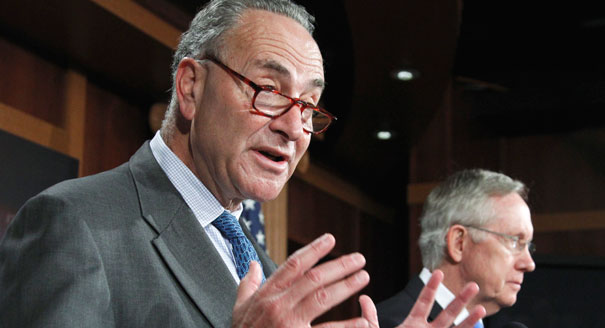Tuesday night, the Senate blocked a vote on the president’s jobs plan. As had been forecast, Republicans voted unanimously against the plan, and they weren't alone: Two Democrats joined them – Sens. Jon Tester of Montana and Ben Nelson of Nebraska. Now it's on to Plan B, which involves breaking up the bill into pieces to be voted on separately.

New York Sen. Chuck Schumer has proposed narrowing the bill down to two parts – one favored by Democrats, the other by Republicans. Under the plan, an infrastructure bank would be created in the model endorsed by the president and the Kerry-Hutchison BUILD Act. In exchange, there would be a tax holiday for corporations to bring back to the U.S. profits they made overseas.
Obama’s bill had also called for a $50 billion investment in transportation infrastructure, and that appears to be dead as the Senate pursues Schumer’s plan. The House had dismissed the transportation component long ago, with Republican leadership saying they might hold a vote on the pieces of the bill that appeal to them (surprise -- stimulus spending isn’t one of them). Meanwhile, some insiders say that Republicans in the House are getting serious about passing a transportation reauthorization before March 31 so that they can show that they, too, are serious about job creation.
Of course, the path they seem to be setting out on involves paying for a higher level of transportation spending with oil drilling, a proposal that’s sure to run up against massive Democratic opposition and possibly even a presidential veto.
And many think that not much is going to happen on any of this until the super committee comes back with its proposals for deficit reduction before Thanksgiving.
Back to the Schumer jobs plan: We’ve written a lot, and will be writing more, about the pros and cons of an infrastructure bank. But what about this idea of repatriating overseas profits?
The plan would allow corporations to stash their profits made outside the country in U.S. banks without paying the 35 percent corporate tax rate they’d normally have to pay. There’s no guarantee that just because that money would now be sitting in U.S. banks that it would be used to create U.S. jobs, though – in fact, a similar repatriation plan in 2004 failed miserably on that front.
Dan DiMicco, CEO of the Nucor steel company, said last week that he’d be in favor of a repatriation holiday where the companies invested part of their repatriated profits in an infrastructure bank. However, Schumer’s thinking doesn't go that far. The tax earnings from the lower tax rate imposed on the repatriated profits would go into the Treasury, plain and simple.
As for the prospects of the Schumer bill, in the GOP's estimation , even this scaled-back plan bears Obama’s mark since it is the offspring of his jobs bill, and therefore Republicans are reluctant to vote for it. Even Lindsey Graham, co-sponsor of the BUILD Act for an infrastructure bank, will only commit to “considering” the new proposal.
Meanwhile, Senate Majority Leader Harry Reid would rather pay for the infrastructure bank with a surtax on millionaires – a proposal Republicans persist in calling “class warfare.”





